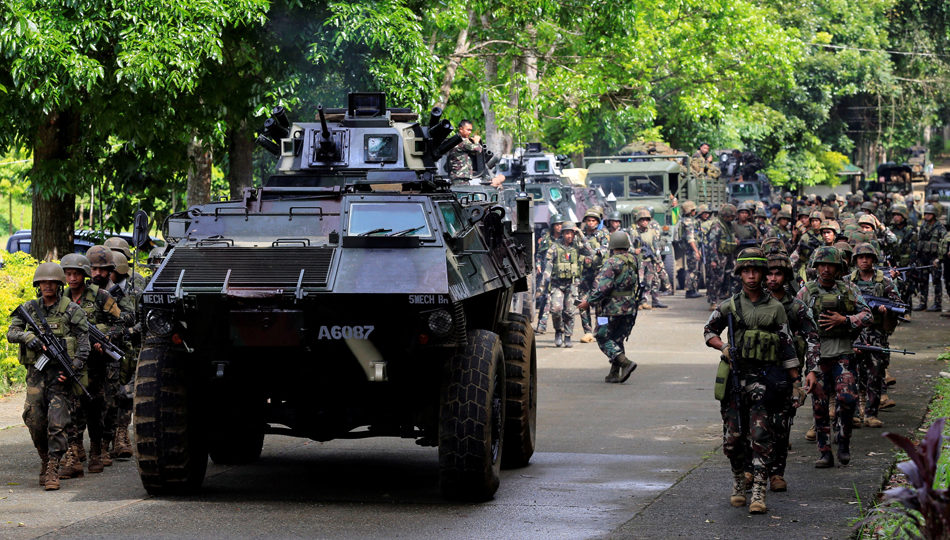Philippine security forces on Saturday intensified a bombing campaign on homes and other buildings in a southern city where they have been battling Islamist militants for five days, and warned there may be collateral damage.
President Rodrigo Duterte declared martial law across the southern third of the Philippines in response to the clashes, which have claimed at least 48 lives and he has said are part of a campaign by the Islamic State (IS) group to establish a local caliphate.
Most of the 200,000 residents of Marawi, one of the major Muslim cities in the mainly Catholic Philippines, fled the city because of the fighting as the military used air raids and engaged in street-to-street battles to flush out the militants.
But, with security forces unable to end the crisis and the gunmen believed to be holding up to 15 hostages, the military warned on Saturday that it would step up the bombing assaults.
“In as much as we would like to avoid collateral damage, these rebels are forcing the hand of government by hiding and holding out inside private homes, government buildings and other facilities,” military spokesman Brigadier-General Restituto Padilla said.
“Their refusal to surrender is holding the city captive. Hence, it is now increasingly becoming necessary to use more surgical airstrikes to clear the city and to bring this rebellion to a quicker end.”
The violence erupted on Tuesday when dozens of gunmen went on a rampage throughout Marawi in response to an attempt by security forces to arrest Isnilon Hapilon, a veteran Filipino militant regarded as the local leader of IS.
The gunmen planted black IS flags, took a priest and up to 14 other people hostage from a church, and set fire to buildings.
Thirteen soldiers, two policemen and 31 militants have died in the fighting, according to authorities.
Two civilians were also confirmed killed inside a hospital that the gunmen had occupied on Tuesday, and the military has said nine other people may have been murdered at a militant checkpoint.
Duterte has vowed to extinguish the threat of the militants, whom he has said belong to the local Maute terrorist group but are being backed by criminals in the area.
Prayers to end ‘terrorism’
Nevertheless, Duterte also said on Friday that he was prepared to talk with the group’s leaders.
His spokesman, Ernesto Abella, said this was partly an offer made in the spirit of the Muslim holy month of Ramadan, which began in the Philippines on Saturday.
“Together we pray for an end to terrorism that falsely claims to advance Islam and seeks to subjugate our land to the brutal IS,” Abella said in a statement.
“In this spirit of Muslim peace, the president has offered the hand of peaceful dialogue to terrorist groups, to avoid bloodshed in this time of prayer, fasting and mercy.”
However there appeared to be an extremely small chance of talks, unless they were to negotiate the release of the hostages.
Local military spokesman military spokesman Lieutenant Colonel Jo-ar Herrera told AFP the fighting could not stop because of Ramadan.
“It is painful for the Maranao (the name for local Muslims) that it is Ramadan but our action now is to protect Marawi,” Herrera said.
“These are the impacts of the local terrorist group’s actions.”
The battle to clear the city of the gunmen was proving hard because they had scattered into small groups and were moving to different houses and setting up sniper positions, according to the military.
“They also have sympathisers from private armed groups,” Herrera said.
Islamist militants working with criminals and corrupt politicians is common across Mindanao, where a Muslim separatist rebellion has claimed more than 120,000 lives since the 1970s.
The Maute, Abu Sayyaf and other small hardline groups are not interested in negotiating peace and have in recent years looked to IS to help them.





Reader Interactions